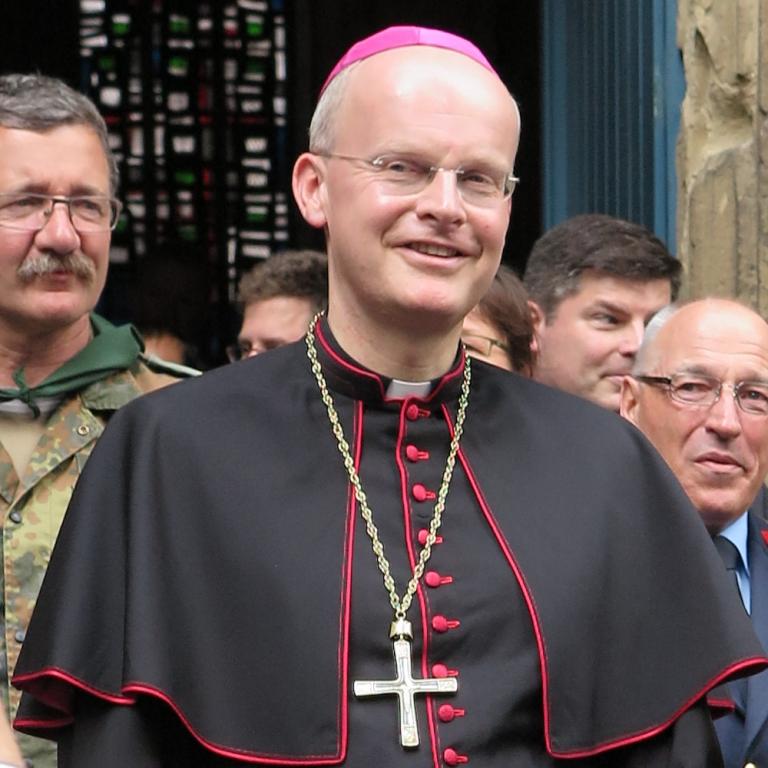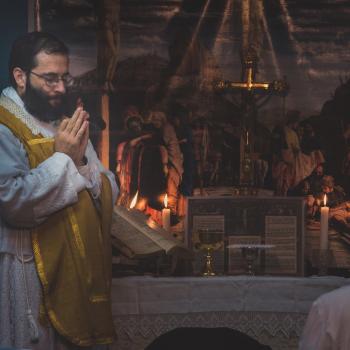
Bishop Franz-Josef Overbeck of Essen recently wrote an essay titled “Overcoming prejudices: The Catholic Church must change its view of homosexuality.” Although well-intentioned, this is incorrect. Let me respond in three parts: distinguishing homosexual inclination from homosexual acts, quoting the bishop, and pointing out why Church teaching cannot (and should not) change based on scripture and tradition.
Distinction
The Catholic Church does not condemn people for being inclined to any particular sin. We all have the inclination to sin. What sins predominate just varies person to person. Some people have the inclination towards sexual activity with the same sex. This inclination is not a sin. However, like many other temptations, acting out on that inclination is sinful. Homosexual acts are sinful and, no sexual act between people of the same sex can be ordered to chastity as marital sexual acts are. “Tradition has always declared that ‘homosexual acts are intrinsically disordered.'” (CCC 2357-2359)
Bishop Overbeck seemed to understand this distinction in 2010. Then, he was adamant that “expressed homosexuality” was a mortal sin.
Bishop Overbeck’s Proposal
Now, here are some quotes from the bishop’s argument to change teaching on homosexuality, as found in La Croix.
[Overbeck:] One thing is certain: Every human being can most respectfully and lovingly enter into interpersonal relationships. Excluding certain groups is therefore the expression of a prejudice which is hard to bear for those excluded and in the final instance leads to discriminating against or even criminalizing them.
The Church doesn’t condemn people of the same sex being close friends and expressing the love proper to a friendship between them. In fact, the Church encourages deep and satisfying friendships. I’ve seen several deep loving friendships. Alice Von Hildebrand expressed the beauty of friendship in lofty words.
Friendship is a precious jewel, and Aristotle was right in viewing it as having the luminous glow of virtue. But what should be said of “holy friendship” rooted in Christ, sharing in His love for the loved one? Those blessed by grace, who live up to the Christian canons of friendship, will have a taste of paradise.
Now, back to Bishop Overbeck.
[Overbeck:] In recent years, the many conversations I have had with individual gay people have deeply touched me, given me much food for thought and have widened my perspective on the issue of homosexuality.
I think it is noble that he reached out to accompany many homosexuals. However, accompanying them should lead them towards the truth. There are Catholic ministries that do this: Courage and Spiritual Friendship can both be helpful for people with such inclinations in different ways.
[La Croix reporter:] Bishop Overbeck said there is, at the moment, almost no other issue quite as capable of stirring up emotions in the Catholic Church as the appraisal of homosexuality. It is therefore both crucial and urgent that the Church address this issue more deeply, he said.
John Paul II went very deep on human sexuality with Theology of the Body, and I hope that the latter part of this article is also deep.
[Overbeck:] Neither a hetero- nor a homosexual orientation can or may be seen as a cause for sexual abuse. And as experts assure us, neither is there an inner connection between paedophilia and homosexuality.
May I point out that 80% of the cases are male and 80% are post-pubescent. Pedophilia is about pre-pubescent individuals. The majority abused by priests are evidently post-pubescent males.
Scripture and Tradition
I want to quote several passages from St. Paul on homosexuality, bring out older tradition showing that marriage requires two sexes and all sex outside marriage is sinful, and briefly touch on Theology of the Body. Similar themes can be seen in the Catechism 2357-2359 which deals with homosexuality.
St. Paul on Homosexuality
Romans 1:19, 25, 26-28.
For what can be known about God is plain to them, because God has shown it to them. […] They exchanged the truth about God for a lie. […] For this reason God gave them up to dishonorable passions. Their women exchanged natural relations for unnatural, and the men likewise gave up natural relations with women and were consumed with passion for one another, men committing shameless acts with men and receiving in their own persons the due penalty for their error. And since they did not see fit to acknowledge God, God gave them up to a base mind and to improper conduct.
I think this clearly shows that sexual activity with someone of the same sex is sinful. But a few more passages can reinforce this.
1 Corinthians 6:9-10.
Do not be deceived! The sexually immoral, idolaters, adulterers, passive homosexual partners, practicing homosexuals, thieves, the greedy, drunkards, the verbally abusive, and swindlers will not inherit the kingdom of God.
It is important to note that homosexual acts are not condemned separately but is condemned in a list of sins. Thus, we Christians need to be against all those sins, not just homosexual acts.
1 Tim 1:8-11 is similar but points out the law is good and gives a longer list of sins.
But we know that the law is good if someone uses it legitimately, realizing that law is not intended for a righteous person, but for lawless and rebellious people, for the ungodly and sinners, for the unholy and profane, for those who kill their fathers or mothers, for murderers, sexually immoral people, practicing homosexuals, kidnappers, liars, perjurers – in fact, for any who live contrary to sound teaching.
Tradition: Marriage Only 1 Man and 1 Woman
The Church historically has been concerned with a wider swath of sexual sin than just homosexuality. Thus, I will quote two teachings from our long tradition: that marriage is only one man and one woman, and that all sex outside marriage is sinful. Since two people of the same sex cannot get married, the logical consequence is that no sexual act between them is moral.
The Second Council of Lyon, which is an ecumenical council most forget about, stated (DH 778):
As regards matrimony, she [the Roman Catholic Church] holds that neither a man is allowed to have several wives at the same time nor a woman to have several husbands.
It gives no options for women to have wives or men to have husbands.
The Council of Florence stated the three goods of matrimony (DH 1327):
The first is the begetting of children and their education to the worship of God. The second is the faithfulnesss that each spouse owes the other. Third is the indissolubility of marriage inasmuch as it represents the indissoluble union of Christ and the Church.
Two of these are impossible even in theory among homosexuals, the third is uncommon in practice. Homosexuals can never beget children. How marriage represents the union of Christ and the Church is built off of sexual complementarity which is lacking if both are the same sex. Finally, the NYT reported that 50% of gay male “married” couples have other sexual relationships with their partner’s permission, with no indication that others don’t do it without their partner’s permission.
The Council of Trent has a few points on marriage as well (DH 1797 & 1802)
[Quoting Genesis 2:24:] “A man leaves his father and his mother and clings to his wife, and they become one flesh.” […]If anyone says that it is lawful for Christians to have several wives at the same time […] let him be anathema.
The first indicates man and woman, while the second reiterates Lyon.
Tradition: Non-Marital Sex Is Sinful
The 6th commandment of the decalogue ahs always clearly indicated no sex outside marriage.
Innocent XI condemned the following laxist proposition in 17679 (DH 2148):
Fornication in itself involves no malice and that it is evil only because it is forbidden.
This indicates that any fornication – sexual activity between two people neither of whom is married – involves malice, or is properly a mortal sin. This also speaks back to natural law: it is not just Church law that condemns it, but the law of human nature.
Gaudium et Spes (49) from Vatican II expresses the goodness of marital love.
This love [between man and woman] is uniquely expressed and perfected through the appropriate enterprise of matrimony. The actions within marriage by which the couple are united intimately and chastely are noble and worthy ones. Expressed in a manner which is truly human, these actions promote that mutual self-giving by which spouses enrich each other with a joyful and a ready will.
If marriage is a unique way to express sexual love and the only place where sexual love is moral, then non-marital acts are immoral.
Theology of the Body
Fr. Peter West Wrote about this in HLI review in 2103. So, I’ll just quote him.
Saint John Paul recognized that at the root of the current cultural divide is confusion about the nature of the human person. There are two basic competing philosophies in the world today. One sees man as the result of a blind process of evolutionary development. The other says that man was created by God in his image and likeness, giving man a supernatural origin and destiny. One philosophy sees man simply as perhaps little better than a barnyard animal, but basically incapable of controlling his impulses. The other sees man as being capable of discipline and love.
Isn’t it true that every healthy person desires to love and to be loved? It is also true that oftentimes people look for love in the wrong places. Particularly with sins of a sexual nature, men are seeking to satisfy a natural desire that God has given us to fulfill his plan for love. Our desires are often distorted because of original sin and our tendency to selfishness. […]
True love in marriage as designed by God must be:
- Complementary – between a male and female
- Exclusive and faithful – no other sexual partners, not even by mutual consent
- Enduring – lasting until death
- Total – without holding anything back from the other
- Open to the transmission of new life
God created us male and female with the intention that man would form families which also reflect the image of God as a Trinity of persons. In the Trinity, the Father makes a gift of himself to the Son. The Son gives a gift of himself to the Father. The Holy Spirit is the personification of the Father and the Son. […]
Homosexual acts are contrary to the natural law. God designed the human body so that male and female would be complementary and capable of transmitting life. Homosexual acts are not complementary and incapable of transmitting life.
Conclusion: Church Teaching on Homosexuality is Stable
With all this evidence, it is clear that Catholic teaching will not, should not, and cannot change. A deeper understanding of the human person and human love leads to understanding marriage and sexual complementarity better. We Catholics want to accompany those with such inclinations, but we should accompany them towards the truth. Marriage is by nature limited to two people of opposite sexes. Any sexual activity outside of marriage is sinful, whether heterosexual or homosexual. We Christians need to be against all sin, including homosexual activity. We are also called to love in diverse ways and I hope that those with homosexual inclinations can find morally healthy ways to love.
Note: to make more articles like this, I depend on generosity from people like you. Please sponsor me on Patreon.











